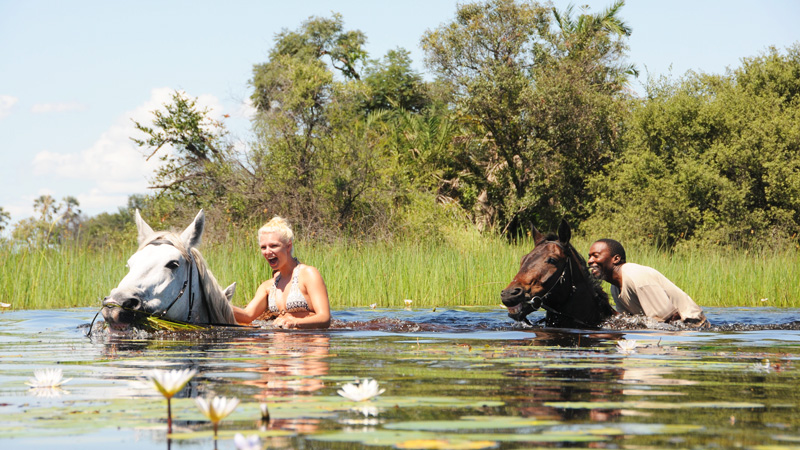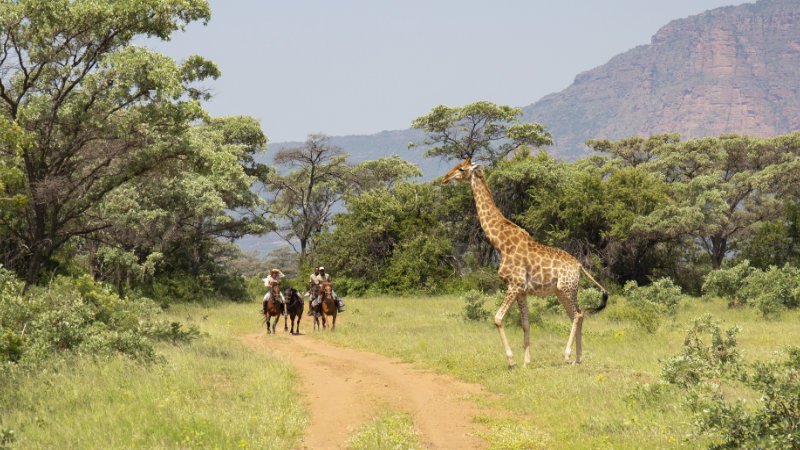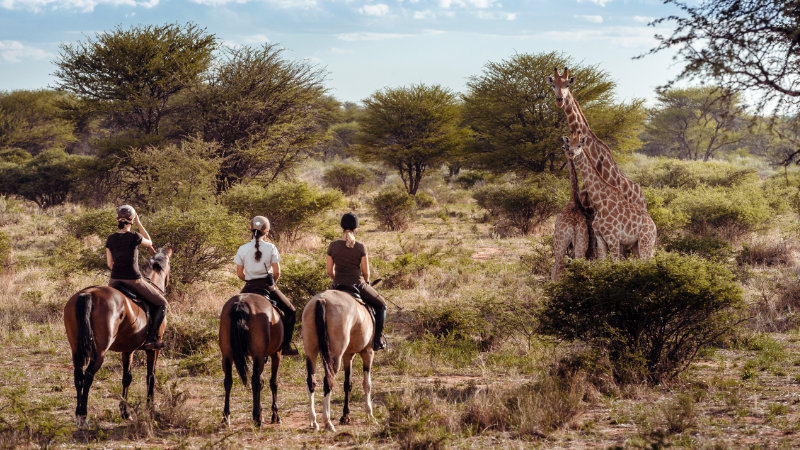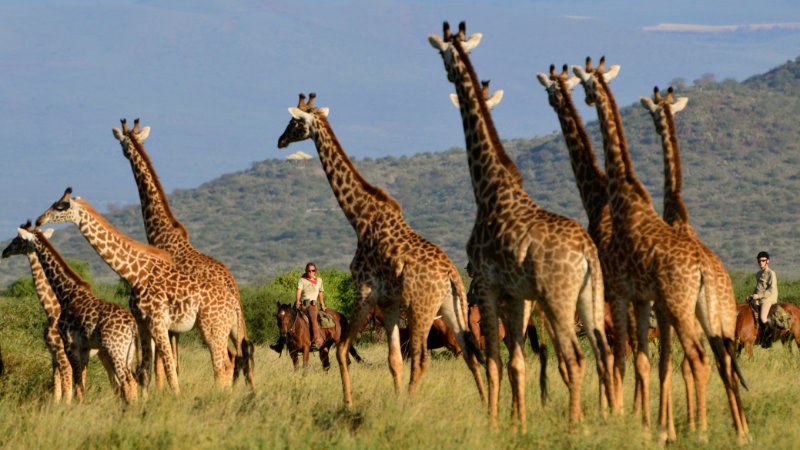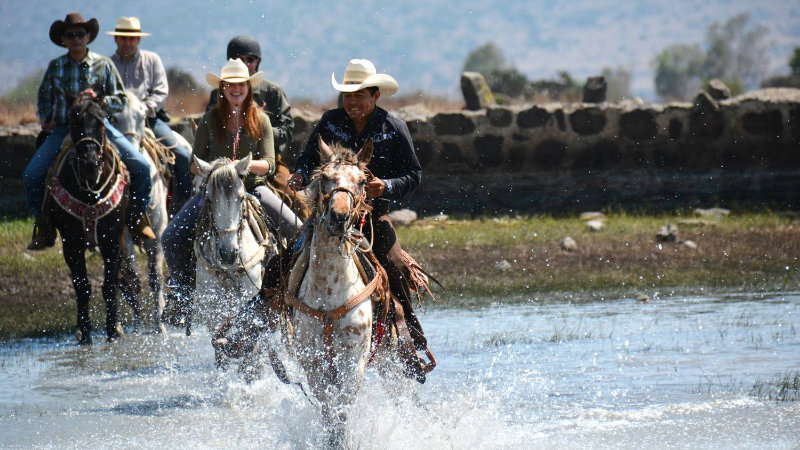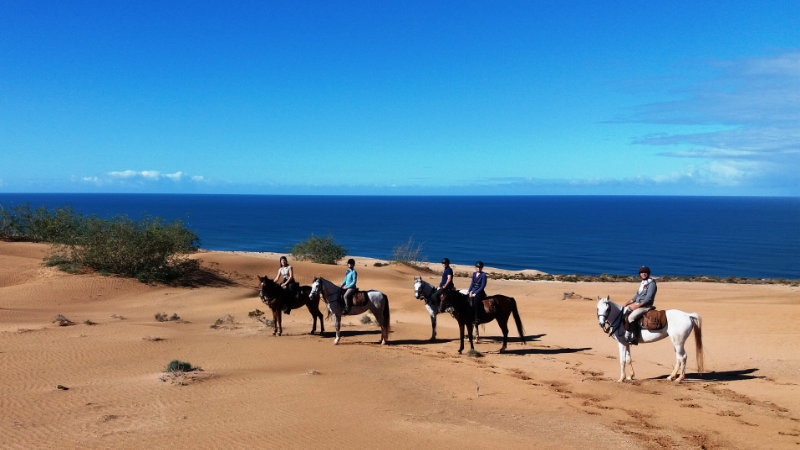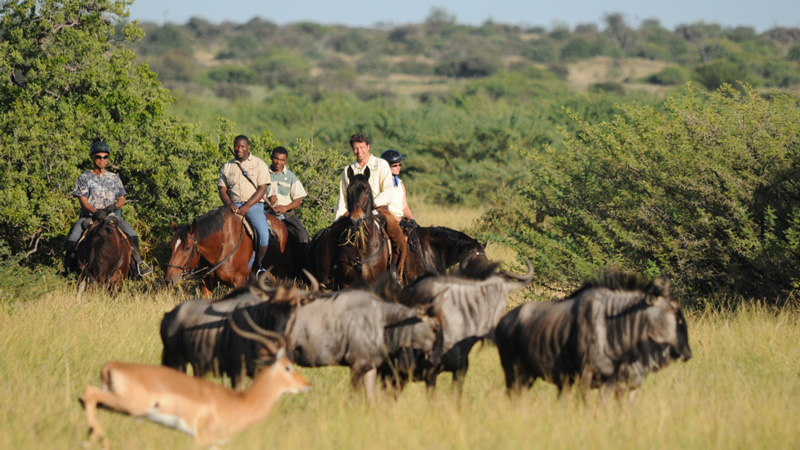Botswana, Okawango Macatoo - riding safari
There is no better way to savour the Okavango Delta and experience its unparalleled wildlife population than on horseback. The annual flooding of the area leaves vast swathes of the Delta inaccessible to vehicles, making horses the most natural and exciting means to explore.
The pace of riding is varied; in between fast and thrilling gallops alongside giraffe, zebra and buck, in water and on land, we quietly stalk bigger game such as buffalo and elephant and take time to indulge in some of the best bird watching in the world.
The experienced guides are full of fascinating stories about the ever-changing landscape, its trees and plants, and have an incredible ability to spot even the best-camouflaged wildlife. The horses also have finely-tuned senses - keep an eye on their ears to see where animals are hiding. Once comfortable, the horses calmly drop their heads to graze, sending a signal to other animals in the area to relax and go about their normal daily routines.
In order to ensure the safest and most enjoyable horseback adventure for everyone, riders must be riding fit and confident at all paces. Days in the saddle can be long, and daytime temperatures can vary, so it is worth the effort to arrive prepared.
With nearly 50 horses of all shapes and sizes, and a choice of western or English saddles, the Macatoo team are experts at putting together the best possible riding partnerships.
Program, 3-7 night riding safari
A sample itenary – This itinerary only serves as a guide; all scenarios are dependent on the season and levels of the Okavango flood.
We do not have set departure dates so you are welcome to choose the dates that would best suit your itinerary. We have a minimum stay policy of 3 nights but recommend 5-10 nights or longer. If you have booked 3 nights, you have time to ride in the morning Day Four before transfer back to airport. If you have booked 5 nights you have time to ride in the morning on Day Six before transfer back to airport.
Day One: You will be met at Maun airport by a member of our team who will assist you with transferring onto the small plane (either a Cessna 206 or 208) that will fly you into camp. The flight takes around 30 minutes and offers a bird’s eye view of the Okavango Delta – it is amazing how tiny the breeding herds of elephant look from the air. A safari vehicle will be waiting for you at the camp’s airstrip for the 45-minute game drive – or an exciting boat ride (depending on the time of year) - into Macatoo Camp where staff will greet you with a welcome drink. After settling into your tent, you will be offered afternoon tea and homemade cake during a briefing from your guide before heading to the barn for a ride. The pace of the evening rides are deliberately slower giving you the time to enjoy the sunsets and make the most of the photo opportunities offered by the birdlife and game. After a hot shower and change, drinks and snacks are served in the comfortable mess tent ahead of a candlelit dinner by the fire.
Day Two: Macatoo’s cheerful “tent ladies” will provide a gentle wake-up call along with your choice of tea, coffee and rusks which are served to you in bed. A light breakfast is set up around the camp fire ahead of the first long ride of the holiday. There is a wide selection of horses in the barn and Macatoo’s experienced staff have the knack of putting together great horse and rider partnerships. Depending on the season, the morning ride may involve some galloping across dried flood plains, swimming through flood waters or pushing on through seas of tall grass to watch giraffe, zebra, antelope, elephant, buffalo - whatever is out there.
A hearty lunch is served every day – you will need it after all those miles in the saddle – the chicken pie is a firm favourite and wine is always offered to encourage a little nap before tea and the evening ride. Sundowners are often enjoyed out in the bush before heading back to camp to freshen up. Dinner is always a great occasion at Macatoo, but there is no guarantee that it is always eaten in the same place.......
Day Three: After listening to the dawn chorus over tea, coffee and rusks in bed, you will have shaken off any first day riding nerves and be eager to get back on a horse. Heading off in a new direction, the landscape will be quite different to yesterday offering fresh game viewing possibilities and a varied pace of ride – guides are always hoping to see the rare semi-aquatic antelope, the red lechwe.
After lunch, the camp pool is an ideal place to cool down, or stretch the muscles that are feeling the effects of the time in the saddle. The deck is a great place to soak up some sun, read and doze, but keep your binoculars and cameras handy as zebra, buck and elephant frequently pass in front of camp. The swimming pool is also a popular watering hole for families of baboons, the babies on their mother’s backs are particularly cute.
After some lovely homemade cakes or scones, evening rides can be swapped for some sunset fishing from boats, or from the banks of pools where hippos wallow. Game drives, walks or boat rides – depending on the time of year – are also available for those wanting time away from the horses or for non-riding partners and guests.
Day Four: We ride through different country, making our way through clouds of bushman hair grass to plains dotted with fig trees. We might encounter giraffe or shyer antelope while passing through mophane woodlands. Our pace increases as we break out onto the flood plains, often disturbing troops of baboons. Return to the camp for an afternoon spent at leisure, or the possibility of hiring a helicopter for an hour to gain access to remote and otherwise totally inaccessible parts of the delta with spectacular photographic results. Finish off the day with a night drive by spotlight, where the resident clan of hyena are often spotted. Bushbabies leap from branch to branch through the terminalia and acacia trees – only seen by the brights of their eyes. If lucky, the spotlight will pick up the glint of a leopard’s sultry stare. If we find lion on the drive or know where they are – perhaps we might have seen them earlier from horseback (and avoided them!) – we can spend quite some time watching them from the safety and comfort of the vehicle, over snacks and drinks, as they wake up from their long afternoon rest, groom each other, and prepare for a night of hunting. It is always such a highlight of the holiday to see a big cat – we will have lots to talk about around the dinner table that night.
Day Five: This morning we ride deeper into the heart of the delta, to corners of the wilderness where vehicles simply cannot reach – horses can get much closer to the big game. We cross high palm islands which offer great sweeping views of the Delta plains – are those anthills or giraffes in the distance? Riders may have joined non-riding friends and family for a walk, drive or boat ride – but all guests will reunite for an unexpected champagne breakfast under a large baobab tree to swap ‘survivor’ stories from the morning. By now, you will have settled into the wonderful rhythm of camp where great adventure, creature comforts and downtime are combined to provide a break. After tea and a gentle sunset ride, you may find yourself at our fabulous tree house where you will have the option to spend the night out, sleeping high up in the tree canopy under the African night sky. From there, it is fascinating to watch and listen as the birds and animals prepare for night – by roosting, travelling or preparing to hunt. The barking of baboons and calling lions provide an unforgettable soundtrack to a night out under the stars. Your guides will stay too, providing great company and peace of mind – for many guests, this is a real highlight of a holiday to Macatoo.
Day Six: After waking up in the treetops, you are whizzed back to camp by vehicle to change before riding off into new terrain. By now, you will have seen most of Africa’s Big Five and riding alongside moving giraffe, antelope and zebras will have become a thrilling, almost daily activity. Make the most of a bush breakfast, or lunch out in the bush and savour the sights and sounds around you. An afternoon by the pool sees many guests desperately trying to even up their ‘farmer’s tans’ – brown arms and face, pale bodies and legs! You may feel torn over how to spend one of your final sunset outings – an evening game drive with a spotlight is often fun, picking up a local clan of hyena, or lions out on the hunt. Above your head Bushbabies leap from branch to branch through the terminalia and acacia trees – only seen by the brights of their eyes. After last night’s treetop sleepover, – a prompt bedtime will most likely to be the most popular after dinner activity, as we save our energy for the last full day and night.
Day Seven: Don’t forget your pocket camera today, but store it carefully because things could get rather wet! We will explore the shallow and deeper flood plains; they look so pretty, scattered with flowering lilies. The reflection of the trees – and your horse – will provide great images to capture. Many of our horses love to eat the lilies as they wade – sometimes swim – through the water. Here, the Cape buffalo can gather in large numbers (anything between a dozen and 2000 at a time). We have to creep up on them using the islands as cover. You will be keen to review your pictures after lunch, but don’t forget to re-charge your cameras in the mess tent! The evening offers the choice of a game drive, fishing or a last quiet evening ride with the by-now familiar smell of wild sage and the warm African dust as the sun goes down, transforming the skyline into a cocktail of oranges and reds. Dinner will be a memorable one perhaps with another surprise location in store…..!
Day Eight: The dawn call of the African Fish Eagle has, by now, become as familiar as the morning alarm at home. The delivery of tea or coffee in bed heralds the start of your last morning in camp and you will be anxious to make the most of your final ride. We stay quite close to home, splashing through water on the vast open plains, home to blue wildebeest and Burchell's zebra. The riding pace will be deliberately quite fast as we cram as much fun as possible into the final hours – be prepared to get wet as we approach deep reedy areas full of bird life including open-billed storks, squacco herons, slaty egrets and egyptian geese. You will return to Macatoo along the myriad of waterways lined with large trees, before arriving back at the barn where you say a sad farewell to your horse. There will be just enough time to shower, change and pack before the game drive to the airstrip, carrying a picnic lunch to tide you over until your return to the real world. Don’t worry, you can always come back – so many of our guests do!
Please note this Horseback Safari is exciting but not strenuous. During cooler months one longer ride may replace the normal morning and evening rides. The owners of the Safari reserve the right to alter the itinerary in any way and leaves this to the discretion of the guides. Local weather conditions may also affect game movements. Also note that depending on individual itineraries some guest might miss their ride on the day of departure or arrival specifically when flying to/from Kasane.
Riding
Be prepared to spend up to six hours a day in the saddle. You will need to feel confident about keeping up with the group, capable of riding at all paces, rising to the trot and controlling your horse at the canter. You may be required to gallop out of trouble, so regrettably we cannot take novice riders.
Riders need to be over 12 years old, be riding fit, and weigh no more than 95kgs (210lbs or 15 stone). Riders who are over the weight limit would need to make special arrangements for this with our reservations team and need to be advanced riders.
We take a maximum of eight people in each group to ensure the best possible standards of safety and enjoyment.
There is a choice of English and Western style trail saddles, each with their own water bottle.
You must be able to ride to one of the following competence levels:
Experienced: Confident at all paces on almost any horse, competes or hunts seriously.
Intermediate: Ridden for a number of years. Able to control fit thoroughbreds at all paces.
Competent: Able to control a sensible/quiet horse at all paces and feels confident on such a horse. Balanced in the saddle and able to rise/post to the trot.
If you are not riding regularly we strongly recommend that you get in practice before joining us on safari. It will be at the discretion of the company whether less experienced riders will be permitted to ride, taking into consideration their safety and enjoyment and that of the group as a whole. The safari reserve the right to prevent any client from riding if we feel they do not fulfil the minimum competence level detailed above.
Many insurance companies will only insure you when wearing a hard hat or safety helmet whilst in the saddle. It is your responsibility to provide your own properly fitted hard hat or safety helmet. We cannot accept any liability whatsoever for head injuries sustained as a result of ignoring this advice. You must be insured to ride – please ensure your policy covers you for horse riding and includes medical evacuation cover.
Accommodation and Food
Our guests are accommodated in eight large and airy tents that blend seamlessly into their natural surroundings while still providing a luxurious, but authentic bush haven in which to relax. Each tent is set on its own large, raised platform, offering panoramic views of a flood plain that can be enjoyed from the bed or deck. A variety of sleeping configurations offer flexible accommodation to suit every need: honeymooners, families or those who are new to or nervous in the bush can relax with peace of mind and privacy.
The newly-built honeymoon tent for couples celebrating any special occasion, has an additional deck for private dining as well as a raised double tub bath offering a view of the floodplain. The ‘family and friends suite' comprises two tents, directly linked by a raised walkway and viewing deck above ground, which provides direct, easy access for parents, children and single travellers who are anxious about sleeping alone.
Between rides and activities, our swimming pool deck has a number of sun beds on which guests can read, relax and soak up the sun. As it also commands a wonderful view of the vast flood plain in front of camp, it is the perfect spot to view birds and game (don’t forget your binoculars). Elephants and giraffe often come very close to the deck and the pool doubles as a popular watering hole for passing families of baboons. Well-lit pathways link up our communal mess tent and dining deck, pool and guest accommodation. A fire burns in front of the mess tent, whatever the time of year, around which we gather to eat under the sun and stars, drink fresh coffee and fine wines and swap stories of the day.
A short drive away, and at the top of a long, sturdy ladder is our magical tree platform where we enjoy lunches, drinks and even the occasional sleepover under the African night sky.
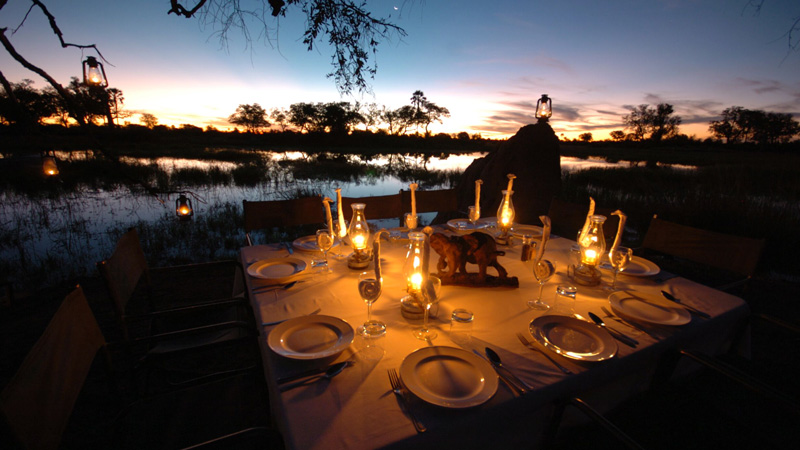
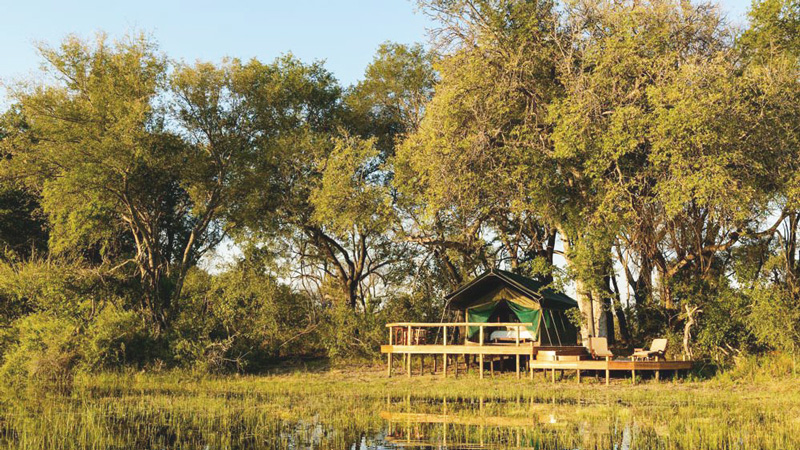
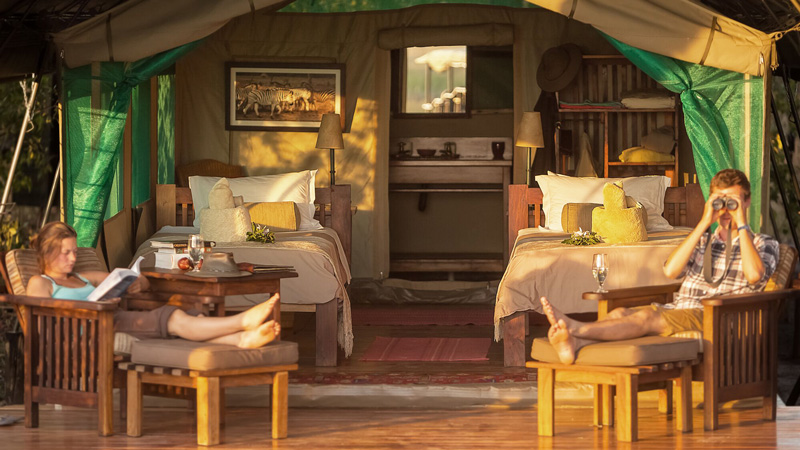
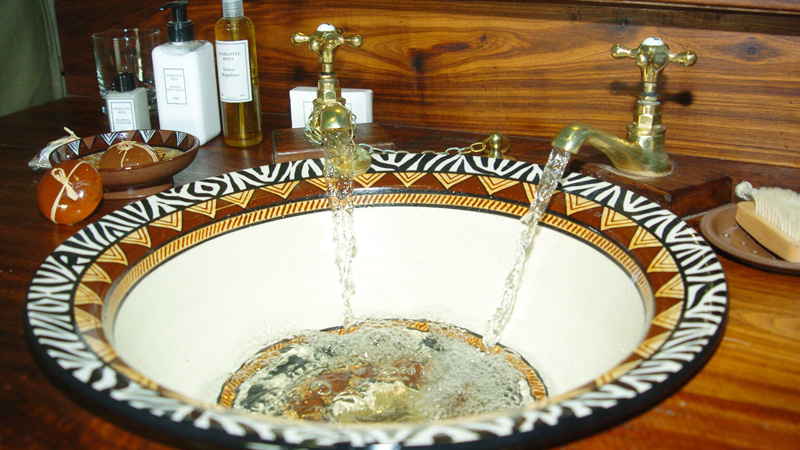
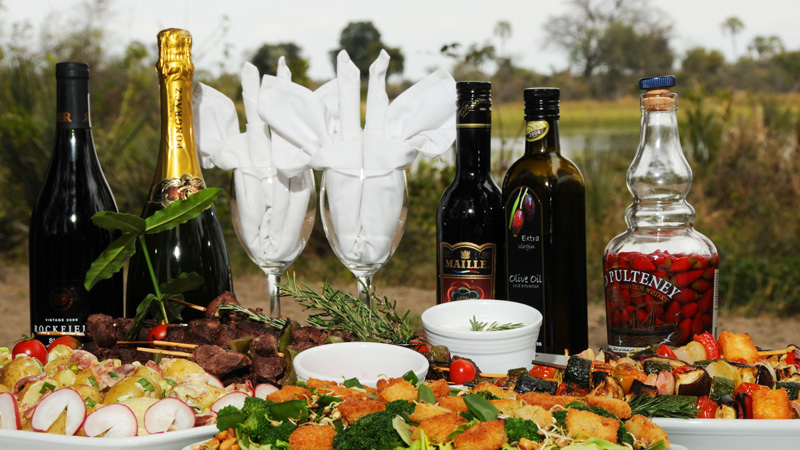
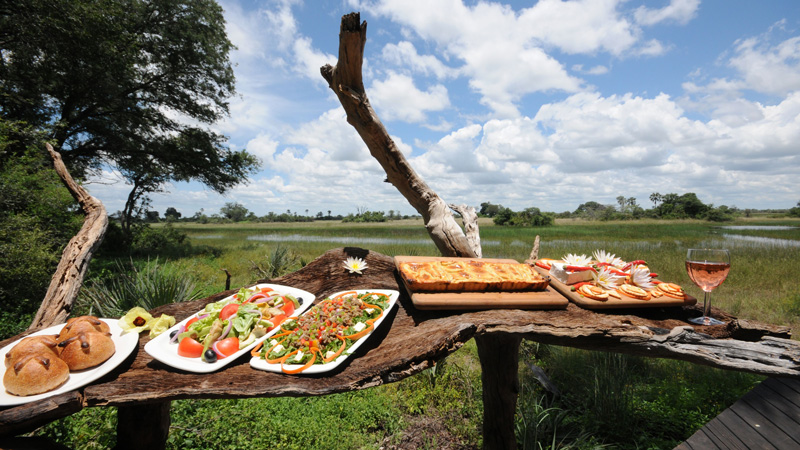
Best time to visit
The best time to come to Macatoo – is when you can get away!
We are always being asked “When is the best time to come?” As this is such a complicated issue with many variables such as weather, water levels and game we have listed below some guidelines to help you decide what suits you best.
January / February
Weather: Warm / hot during the day with morning rides in a breeze – pleasantly warm at night. Small possibility of rain. Bush is green and lush – grass tall and green.
Temperature: Day: temps can reach 35°-45°C in the middle of the day Night: 10°-20°C
Water: Rain pools in the Mopane forests and on the open plains – but floodwater unlikely at this time.
Game: Cats around and plains game such as zebra, wildebeest, impala and kudu. Nomadic bull elephants and birds in breeding plumage.
Clothing: Lightweight riding gear, a raincoat and swimwear.
March / April
Weather: Warm / hot during the day – pleasantly warm at night. Small possibility of rain. Bush is green and lush – grass tall and green.
Temperature: Day: 25°-35°C Night: 10°-20°C
Water: Plenty of rain pools left over from the rainy season – but the floodwater is unlikely to be within riding distance of the camp.
Game: Because of the rain and waterholes, the game is dispersed all over the country – so not concentrated in herds yet. Possible still to see the plains game: zebra, wildebeest, impala etc as well as elephant, maybe buffalo and cats.
Clothing: Lightweight riding gear, a raincoat and swimwear.
May
Weather: Cooler at night, but still pleasantly warm during the day. Unlikely to rain. Bush still green but grass getting shorter.
Temperature: Day: 20°-30°C Night: 5°-10°C
Water: The Okavango annual floodwaters normally arrive in May or June – so are within riding distance for a couple of weeks before they actually reach camp. The floodwaters bring long shallow water canters on the floodplains and deeper channels to cross. As water levels rise, motorboat replaces vehicle game drives and mekoros are also in use into November.
Game: When the water arrives initially the birdlife is great as they feed off the shallow water areas. Game comes to drink from the water, with the buffalo and lechwe moving in as the water levels increase. However, there is a lot of water – so much of the game is still dispersed.
Clothing: A splash proof jacket, a fleece/sweater for evenings and swimwear.
June / July / August
Weather: This is our winter and can be chilly / cold in the early morning and evenings but warm in the middle of the day. Bush getting drier except around the edges of the islands where the green shoots start to come through.
Temperature: Day: 20°-25°C Night: 3°-5°C
Water: The water is at its highest levels, so plenty around to ride through and go boating on either in the motor boat or mokoro (canoe).
Game: Large herds of lechwe forming in the wetlands and perhaps hippo and crocodile in the area. Good potential for buffalo sightings with impala, tsessebe, kudu etc moving inland on islands.
Clothing: Splash proof jacket, a warm fleece/sweater for evenings.
September / October
Weather: Winter is over and it gets progressively hotter building up to the first rains, which clear the hazy days and the skies are big and beautiful. Trees come into flower and then leaves go green and fruits grow. Evenings are warm and the plunge pool gets a lot of use! Bush is dry and grass short.
Temperature: Day: 30-45°C Night: 15°-25°C
Water: The floodwater normally stays around the camp area until October – but this, of course, depends on how big the flood was to start with. As the floodplain water recedes, drinking pools of water remain – hopefully until the next rains come!
Game: The game now tends to concentrate as the water sources lessen – often big herds of buffalo, elephant and with shorter grass more plains game can be seen. More likely to see wild dog as well as the cats who favour dry savannah such as cheetah. Young giraffe and lechwe; hyenas more evident cooling off in the pools.
Clothing: Lightweight riding gear, a fleece/sweater and swimwear.
November / December
Weather: The rainy season is any time from November – but impossible to say exactly when and how much. Normally the rain comes for an hour or so every day and then often goes away for a week or more before it rains again. It is warm to sticky hot before the rain and cooler after each rain. Bush turns green with the rains and many of the trees and flowers come into bloom while the sunsets become increasingly dramatic.
Temperature: Day: 30°-40°C Night: 15°-20°C
Water: Depending on the flood level, there will be some water around with the rain topping up the pools.
Game: Very good until the first rain when it disperses again – the young antelope are born at this time and are very entertaining to watch.
Clothing: Lightweight riding gear, a raincoat and swimwear.
Horses
Macatoo’s string of horses are as well looked after as their guests. Each horse – they are all boys – is recognised and appreciated for his unique ability and personality and every effort is made to match him with the most suitable rider. Our guests rotate between two or three horses during their time with us to ensure that each animal is given time to recover between rides. We have Thoroughbreds, Namibian Hanoverians, Percherons and Kalahari-Arab crossbreeds ranging between 14hh and 18hh (140-180cm).
With nearly 50 horses in the barn, all schooled and well-mannered, we are able to ensure every one is fully fit and rested with downtime out in the paddocks to give our guests the best possible ride.
One of the most popular spectacles at Macatoo is the sight of the resting horses galloping home from their mobile paddocks each afternoon.
Riders need to be over 12 years old, be riding fit, confident at all riding paces and weigh no more than 95kgs (210lbs or 15 stone). We take a maximum of eight people in each group to ensure the best possible standards of safety and enjoyment. Be prepared to spend up to six hours a day in the saddle. This holiday is not suitable for novice or beginner riders.
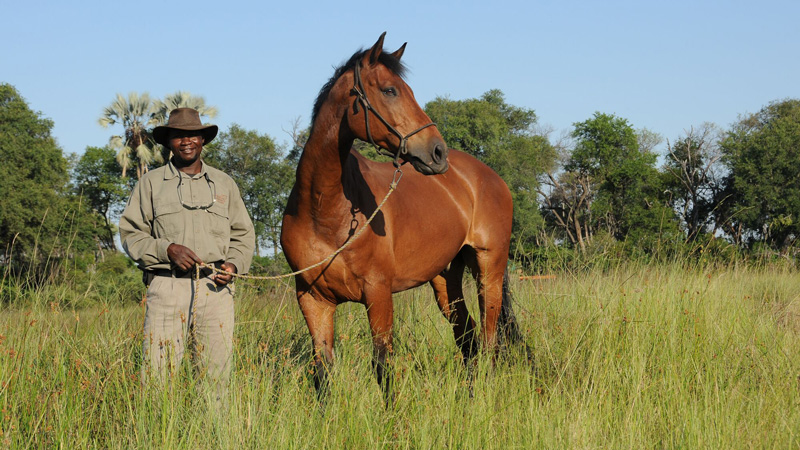
All Welcome
An African safari adventure at Macatoo does not have to involve horses and we can easily cater for non-riding spouses, partners, friends and children. Indeed, many of our riding guests like to have time away from the saddle and take advantage of the wide range of other activities on offer.
Game drives offer the opportunity to track and photograph birds and big game in stunning settings. Going out in our open top safari vehicles at dawn or dusk provide the best chances of seeing wildlife on the move, hunting, feeding, drinking or roosting.
The arrival of the floods, usually in May, brings with it the unique chance to explore the Delta by water, and many guests are lucky enough to arrive in camp from the airstrip by motorboat. The mokoro, a traditional dugout canoe which is navigated through the waters by a skilled poler, offers the most romantic way to view the Delta at this special time of year. The tranquillity and silence of the journey enables guests to feel at one with nature and see at close quarters how the animals and birds adapt to their ever-changing environment.
Fishing, from boat or land, is a hugely popular pastime with both riding and non-riding guests. We have access to a wide range of beautiful fishing spots where guests cast between water lilies and wallowing hippos. The challenge is not only to get a fish to bite, but land it before it is snatched from the line by swooping fish eagles and kingfishers.
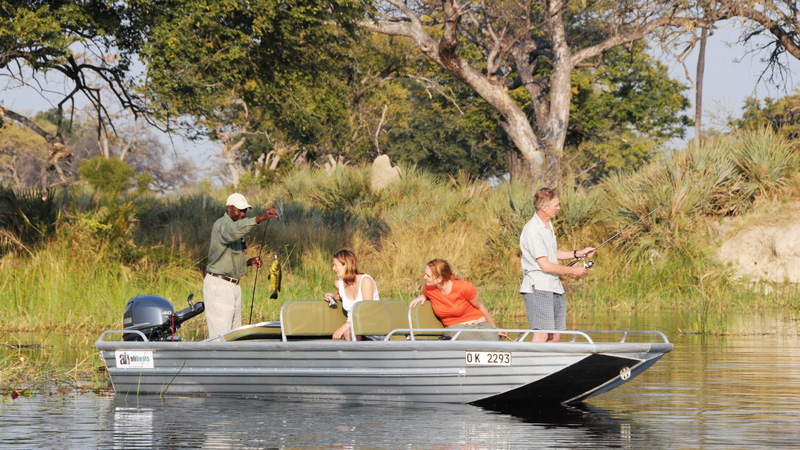
S A M P L E I T I N E R A R Y - 3 Night Safari (non riders)
Day One: You will be met at Maun airport by a member of our team who will assist you with transferring onto the small plane (either a Cessna 206 or 208) that will fly you into camp. The flight takes around 30 minutes and offers a bird’s eye view of the Okavango Delta – it is amazing how tiny the breeding herds of elephant look from the air. A safari vehicle will be waiting for you at the camp’s airstrip for the 45-minute game drive – or an exciting boat ride (depending on the time of year) - into Macatoo Camp where staff will greet you with a welcome drink. After settling into your tent, you will be offered afternoon tea and homemade cake during a briefing from your guide before heading out into the African bush to enjoy the sunset and make the most of the photo opportunities offered by the evening light. After a hot shower and change, drinks and snacks are served in the comfortable mess tent ahead of a candle-lit dinner by the fire.
Day Two: Macatoo’s cheerful “tent ladies” will provide a gentle wake-up call along with your choice of tea, coffee and rusks which are served to you in bed. A light breakfast is set up around the campfire ahead of your first long morning activity. We try to get out there as early as possible and depending on the season, we may head out in the boat through the flood waters or jump into the safari vehicle again driving through seas of tall grass to watch giraffe, zebra, antelope, elephant, buffalo – whatever is out there. A hearty lunch is served every day – you will need it after the early start – the chicken pie is a firm favourite and wine is always offered to encourage a little nap before tea. Afternoon activities are leisurely and often include mokoro trips – the dug out canoes used by the local fishermen of the Delta – that enables you to travel over the flooded seas of grass. This is the ideal opportunity to ask questions and take photographs. Crocodile sightings are not infrequent and the bird-life is some of the best in the world. Sundowners are often enjoyed out in the bush before heading back to camp to freshen up. Dinner is always a great occasion at Macatoo, but there is no guarantee that it is always eaten in the same place.......
Day Three: After listening to the dawn chorus over tea, coffee and rusks in bed, you will be eager to get back out there. Heading off in a new direction, the landscape will be quite different to yesterday offering fresh game viewing possibilities – guides are always hoping to see the rare semi-aquatic antelope, the red lechwe. After lunch, the camp pool is an ideal place to cool down. The deck is a great place to soak up some sun, read and doze, but keep your binoculars and cameras handy as zebra, buck and elephant frequently pass in front of camp. The swimming pool is also a popular watering hole for families of baboons, the babies on their mother’s backs are particularly cute. After some lovely homemade cakes or scones, we head off for some sunset fishing from boats, or from the banks of pools where hippos wallow.
Day Four: The dawn call of the African Fish Eagle has, by now, become as familiar as the morning alarm at home. The delivery of tea or coffee in bed heralds the start of your last morning in camp and you will be anxious to make the most of your final day. We stay quite close to home, gliding through the waterways in the boat and admiring the vast open plains, home to blue wildebeest and Burchell's zebra. You’ll try to take in as much as possible as we approach deep reedy areas full of bird life including open-billed storks, squacco herons, slaty egrets and egyptian geese. We will return to Macatoo along the myriad of waterways lined with large trees. There will be time to shower, change and pack before the game drive to the airstrip, carrying a picnic lunch to tide you over until your return to the real world. Don’t worry, you can always come back – so many of guests do!
Travel Information
Ability description: Trail Ride level 3
You need to be a capable and experinced rider. This is big game area and you should be able to stay on your horse and stay calm and in control.
Included in the price: 5 or 7 nights accommodation, 5-7 days riding, all meals and local beverages.
Not included: International flights, Charter flight from Maun/Kasane to camp, Visas and full travel and medical insurance - which is essential, gratuities for camp staff and guides, purchases from the curio shop
Travel: Fly to Maun, in Botswana
Transfers: Book and pay in advance to horseXplore.
Flights to Macatoo is a 30-minute scenic flight from Maun or 1½ hours from Kasane (which is located on the Botswana side of Victoria Falls), followed by a game drive/boat trip, depending on water levels. Due to the Kasane flight being longer guests would not be able to ride on their day of departure.
Costs are per person one way and include government and airline taxes, which are subject to change.
Price: Maun-Macatoo Camp EUR 350 per person. 50% discount offered on return flights from Maun to Macatoo for any bookings of 7 nights or more.
Kasane- Macatoo Camp EUR 490 per person
NOTE. Weigth limit on luggage is max 20kg (no wheels) which includes hand luggage and camera
equipment. For safety and logistical reasons all bags must be soft sided and easily manageable with a maximum dimension of 35cm x 70cm.
Season: Low season: January – Mars, December, Mid season: April – June, November, High season: July - October
No of riders: Min.1 and max. 8 per group
Single Supplement: 50% on daily rate will apply if not prepared to share twin-bedded accommodation. There is one tent dedicated to single travellers where no single supplement would apply, subject to availability.
Non-Riding Partners and Children: 50% discount offered for non-riding children (under 12 years old) and 10% discount offered for non-riding adults. Non-riding activities include game drives, boating, mokoro excursions and fishing (all activities are subject to water levels).
Weight limit for riders: 95kg no supplement, 95-100kg no extra supplement but subject to availability, exceeding 100kg by special arrangement only
Currency: We suggest you exchange your cash into dollars, you shouldn’t need local currency as your holiday is fully inclusive. Botswana tourism levy can be paid in dollars. Gratuities, onsite curio shopping can be paied in dollars.
Electricity: Bring extra batteries and it could also be good to bring a solar charger.
Safety: Hard hats are not mandatory but the insurance of the safari does not cover anyone not wearing one. You have to bring your own.
Visa: You must be in possession of a passport that is valid for at least six months after your return date and has at least 3 blank pages. Visas are not necessary for most countries but we do advise that you contact your local embassy and make sure you don’t need one.
Wi-Fi: There is no wi-fi or cell phone reception at Macatoo. Only satellite phone available for emergencies.
Credit cards: 5% handling fee will be charged on all credit card payments.
Misc: A Tourism levy of $30 pp is sometimes payable on entry into Botswana. Please bring dollars to avoid inflated exchange rates and bring the correct amount as there is sometimes a lack of change at borders. Other costs such as souvenir shopping and gratuities can also be done in dollars.
Terms of payment and cancellation rules
- Registration fee 20% must be received by HorseXplore no later than 5 days from
booking confirmation.
- Final payment 80% must be received by HorseXplore no later than 60 days before
departure.
Cancellation policy:
In case of cancellation following fees will be charged
> 30 days prior to arrival 20% of the total price
< 30 days prior to arrival 100% of the total price
Your cancellation must be received in writing at our office during office hours no
later than the specified number of weekdays before the start of your journey
from home.
Feedback from our travellers
A magical experience from start to finish!
I was greeted with songs and an exciting jeep ride. The lodge was amazing, with all the comforts of home, including a toilet and a proper shower with hot and cold water. All the food was absolutely delicious – why don’t we have more African food in Sweden?
The horses were fantastic, and the guide was incredibly knowledgeable – I have never ridden so fast, absolutely amazing! They were quick, friendly, and very sure-footed.
The service was always top-notch, with a great sense of humor and warmth. The guides clearly love their job and take great pride in giving us the best experience – and you can tell they truly love their country.
Tip for you: Promote this more – it’s an absolutely fantastic place! I always travel with HorseXplore because it suits me perfectly.
– Gisela Warbert

